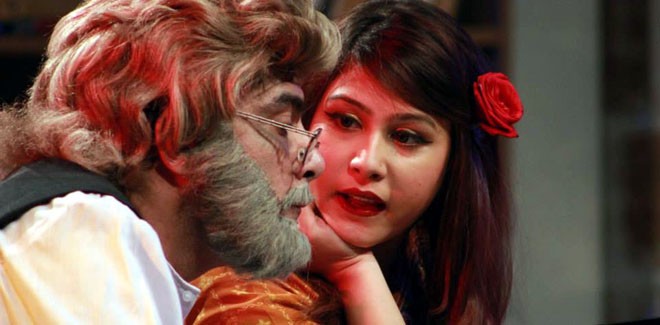

Karachi and Lahore have recently seen people thronging theatres to watch the latest KopyKats production -- Haaf Playt. Directed by Dawar Mehmood, it is a stage adaptation of Anwar Maqsood’s 1990 teleplay by the same name and a self-proclaimed tribute to the original cast. And, a tribute it is. Apart from the altered spelling, there is nothing much new about the play. From the stage backdrop to the actors’ get-up, everything is an attempt to reproduce the teleplay’s ambiance on stage.
Aired in the 90s on PTV, Half Plate was a quintessential Anwar Maqsood satire, loaded with dialogues that were dripping with sarcasm. Though the stage play has retained the original tone of the story, some dialogues and characters have been pruned in consideration of the change in medium.
Revolving around a bickering old couple, the script constantly pits the husband Mirza Nafees Barelvi (played by the young theatre wizard Yasir Hussain), against his cantankerous wife Bano (Maryam Saleem). Mirza Sahib is a self-styled intellectual and poet whose wife is more concerned about their financial condition than the strength of his couplets. Their sarcastic jabs at each other are interrupted, and fueled, by the entrance of some very interesting characters.
Tamanna (Alizeh), a budding poetess, enters the Barelvis’ depressing environment like a burst of colour. Her flirtations provide some comic relief as she befuddles at first Mirza Nafees and then his effeminate poet-of-a-son Karim Barelvi (Ishtiaq Rasool).
Karim, a hapless and horrible poet, is a personification of everything that Mirza Sahib considers essential to an intellectual’s personality and everything that Bano detests about poets.
This straitened middle-class family is duly jolted by the appearance of their loud and angry landlord, Butt Sahab (Zahid Ahmed). His ferocious demands for the long-overdue rent temporarily unite the family. Their attempts to distract him are unwittingly aided by the appearance of Tamanna and Bano’s ex-fiance Iftikhar "from Canada". The witty repartee between this motley crew of characters is utilised by Anwar Maqsood to allude to a number of serious issues faced by a Pakistani society.
The comic wordplay is interspersed with references to national concerns that are, unfortunately, still as relevant as they were in the 1990s. Couched between the characters’ jabs at each other’s personalities are words like "tangdasti" bomb, terrorists and Afghanistan. In one scene, Mirza Barelvi retorts to his wife’s taunt about the loss of half her dower, with reference to the loss of half of Quaid-e-Azam’s Pakistan.
Likewise, when Bano tries to shrug off their dire financial conditions as "puray Pakistan ka haal" in front of Iftikhar, she could just as easily be talking about present-day Pakistan as well as the Pakistan of the ‘90s. Sadly, these problems have not ceased to exist for our society but the focus on those themes has by now become redundant for theatrical audiences.
However, since Haaf Playt is in essence a tribute to the original production, a certain amount of staleness was to be expected in the storyline.
The sense of familiarity between the two plays ends here. As the elder Mirza Sahib tries to pacify his suspicious wife with the reasoning that the "nukta upar se nichay phesal gaya" slippage made all the difference, something seems to have slipped through the fingers of the young team of Haaf Playt.
The teleplay was a big hit back then because of its boldness in approaching grave matters as the impeccable acting of its versatile cast that comprised legends such as the late Moin Akhtar, Latif Kapadia, Jamshed Ansari and Khalida Riyasat. It provided a study of the different shades of human nature.
Even though the stage actors are very convincingly styled in the image of the original cast, they failed to leave their mark on the characters they portrayed. Admittedly, it is no easy task to fill the shoes of the legends. The younger cast’s emphasis seemed to be more on imitation than inhabiting their respective characters. They came across as rather stereotypical and one-dimensional. The stress on paying a tribute to the veterans seems to have translated into unimpressive acting on the part of the newer cast.
Eventually, it is Anwar Maqsood’s ingenious wordplay that prevents the stage production from becoming lacklustre. There are times when the humour becomes slapstick and the acting, especially that of Zahid Ahmed, exaggerated.
Surprisingly, the audience at Lahore’s Alhamra theatre hall did not seem to mind any shortfalls. The character that could be called as the most stereotyped -- Butt Sahab’s -- was the one most well-received.
The general consensus among the crowds exiting the halls was that he was just ‘too good’. From start to finish, the audience clapped and chortled at each scene. For the people who came to watch the Anwar Maqsood-KopyKats collaboration, Haaf Playt provided a welcome opportunity to laugh out loud.